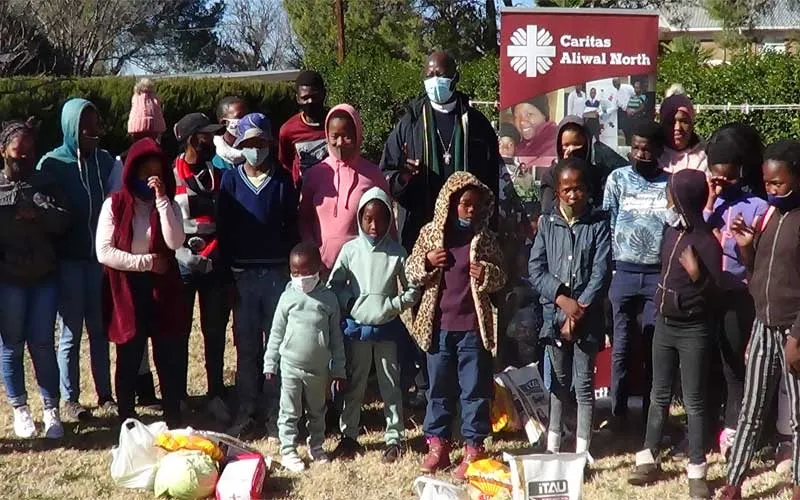Currently, he adds, “17 children still need the help of the police or Department of social development to assist them.”
The Caritas office, the Bishop says, has become “the voice of the voiceless” and has over the years offered guidance, aid and support to the vulnerable children.
“Our office has given light to this painful crisis that is a reality in our communities,” Bishop Kizito says, and adds, “We have been able to offer and serve these children with respect and to give them their due human dignity.”
The Bishop notes that human dignity is one of the most important human values, adding, “We all need to live as human beings with value. Our office has done that by welcoming the vulnerable children in our offices with love and without any form of judgement.”
“We offer them our services with dignity. These children and their parents are accepted as friends in our office and that is what we encourage other communities to do as well. We understand them, their situation and their needs. They are not seen as competitors to the few resources that we have. They are made to feel they are part of the bigger family of Aliwal North. We instill in them the sense of belonging,” the Bishop says.
(Story continues below)
The Local Ordinary of Aliwal admits that it has not been easy for the stakeholders involved in the children’s situation to obtain the necessary supporting documents to give the children a sense of belonging.
He says that for the project to be sustainable, South Africans need better awareness of the situation of stateless people and migrants.
The Catholic Church leader further says that Caritas Aliwal and other organizations that have come up strongly to advocate for the needs of the stateless people also need more resources in their work.
In one of the recent outreach programs, Caritas Aliwal in the company of the Local Ordinary of the South African Diocese gave out food parcels to stateless children.
“The Caritas Office has made it a commitment to make sure that these children for the last five years can have some food parcels and school uniforms, so that their self-esteem can be uplifted. All the different donations from different people have been welcomed and they have brought a huge change and positive impact to these children,” Bishop Kizito says.
He further says that with lack of food, former stateless children still miss school.
All the gains notwithstanding, the Caritas office of the South African Diocese is facing a myriad of challenges, key among them the lack of collaboration with the different departments that are working together for the vulnerable groups.
Additionally, Bishop Kizito says that a number of illegal foreign families prefer to remain in South Africa, than to return to their homeland.
He says that the ease of movement from the Kingdom of Lesotho makes immigrants flood South Africa’s border towns, thus putting a strain on its resources.
“It is common knowledge to us that these illegal immigrants are mainly in the towns that are surrounding the Kingdom of Lesotho. People from Lesotho can easily walk from the other side of the border of the Kingdom to South Africa,” he says, and adds, “There is a negative impact on our small resources, like health, and education sectors.”
The situation, the native of Uganda says, has raised resentment from South Africans who he says are also suffering because of limited resources.
The illegal immigrants have also raised the number of the unemployment in Sterkspruit and in Aliwal, Bishop Kizito says, and adds, “There are people who have just turned away their eyes from these people and have looked away on the other side, like the Priest who was going on the way of Jerusalem to Jericho and he did not take care of the man who fell victim to robber.”
Additionally, the people supported by the South African Caritas office are constantly on the move, moving from one town to another, changing locations and are at times unreachable on their phones. This way, Bishop Kizito says, one has to keep tracking them from time to time.
There is a lot of ignorance about the human rights and dignity of stateless children, Bishop Kizito says, and explains that the children who are often abused and exploited are sometimes forced to pay bribes at the border posts to be allowed entry into South Africa.
Commenting on the issue of children's involvement in bribery and border posts, Bishop Kizito says, “Our goal in this project has always been aiming at making sure that these children are integrated into our community legally without shortcuts.”
In the integration process, the Caritas office of Aliwal Diocese ensures that all refugees and migrants are registered.
Bishop Kizito says that his joy is in giving former stateless children a sense of belonging.
“These children are now able to attend schools, and now most importantly, belong. They are part of us and we thank all the role players who made it possible for some of these children to belong,” the Bishop says.
He adds, “We all need a better life. We all need to belong. No one needs to grow up without documents or to grow up in an underground world. We should not separate people from each other.”
Agnes Aineah is a Kenyan journalist with a background in digital and newspaper reporting. She holds a Master of Arts in Digital Journalism from the Aga Khan University, Graduate School of Media and Communications and a Bachelor's Degree in Linguistics, Media and Communications from Kenya's Moi University. Agnes currently serves as a journalist for ACI Africa.








